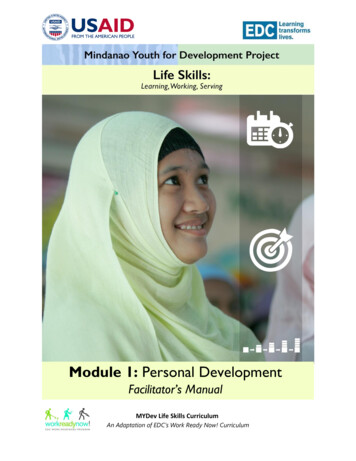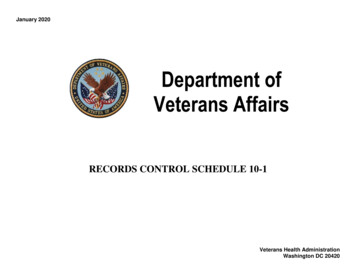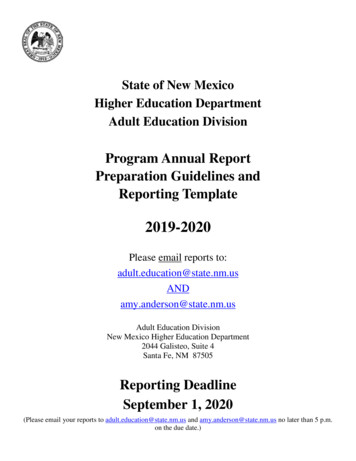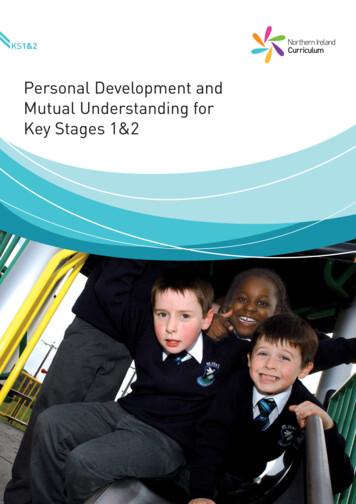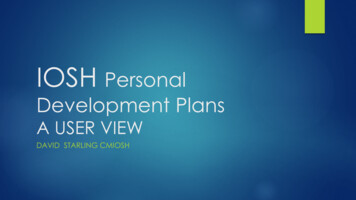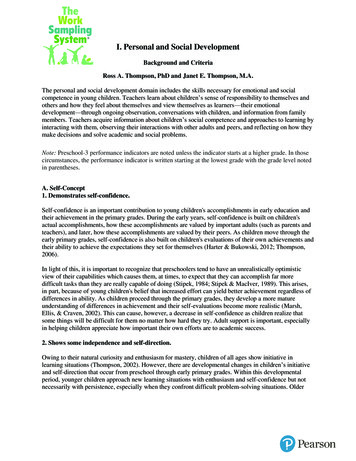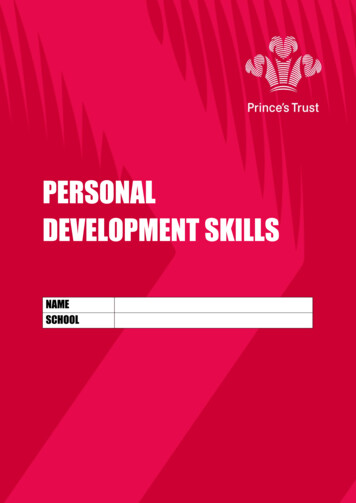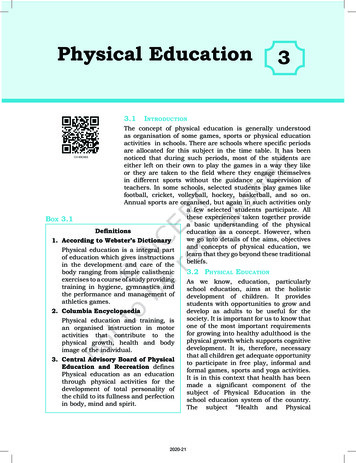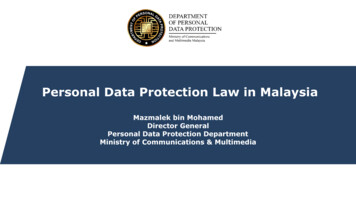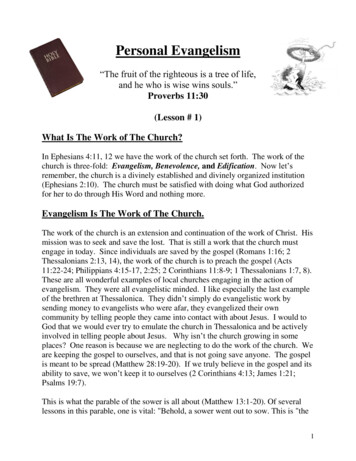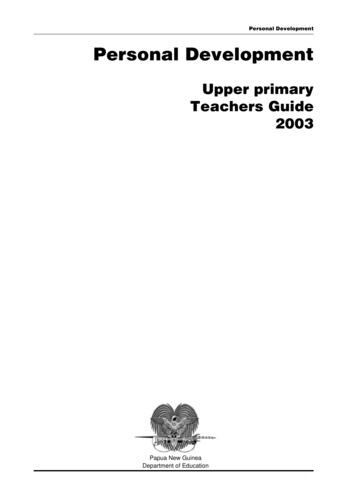
Transcription
Personal DevelopmentPersonal DevelopmentUpper primaryTeachers Guide2003Papua New GuineaDepartment of Educationi
Upper Primary Teachers GuideIssued free to schools by the Department of EducationPublished in 2003 by the Department of Education, Papua New Guinea Copyright 2003, Department of Education, Papua New GuineaAll rights reserved. No part of this publication may be reproduced, stored in aretrieval system, or transmitted in any form or by any means, electronic,mechanical, photocopying, recording or otherwise without the prior writtenpermission of the publisher.ISBN 9980-930-34-9AcknowledgmentsThis Teachers Guide was written and coordinated by Colette Modagai. The NationalDepartment of Education acknowledges the work of the Curriculum DevelopmentDivision, the Subject Advisory Committee, United Nations Population Fund (UNFPA)through the Population Education Project and the following provinces, schools,colleges, institutions and individuals contributed to the development of this TeachersGuide through workshops and through consultation meetings.Senior inspectors and other inspectors and provincial education officers and headteachers, teachers in the following primary and community schools were involved inthe subject trial.SchoolsEast Sepik: Kaindi, St Mary’s, Kreer, Moem, Hayfield, Maprik Catholic, MaprikAdmin, Brikiti, Supari, Sir Peter LusMilne Bay: Alotau Ladava, Rabe, Divinai, Siasiada, Sideia, Logeia, Fife Bay, Naura,Lelehoa, Goilanai, Hagita, St Mary’s Okaikoda, Losuia, Omarakana, SilaketaWestern Highlands: Rabiamul, Tarangau, Hagen, Kagamuga, Holy Trinity, BanzNew Ireland: Carteret, Pinikidu, Eli Wanera, Sacred Heart, Livitua, Lakurumau,Kimadan, HalisEast New Britain: Keravat, Malaguna, Napapar, Vunadidir, Tanaka, VunairotoMadang: Bahor, Holy Spirit, Megiar, Sagalau, Bogia, Jomba, Lutheran Day, Gum,Dangsai, Dor, Naringel, KambosManus: Lorengau East, Pombrut, Bundralis, Dunomashi, Pityluh, Vorei, Bipi, Powat,Pityluh, Baluan, Kari, Kawaliap, Lombrum, Mokoreng, Wilhem Metpi Melpi, BuyangInstitutionsPNG Education Institute, Gaulim Teachers College, Kabaleo Teachers College, OurLady of Sacred HeartIndividuals and Non-Government OrganisationsLester Billy, Division of Health, Alotau, Desley Paanasae, Ninikin Division ofCommunity Development, Wewak, Mary Soondrawu, Council of Women, Wewak,Daniel Bu,Youth Development, Wewak, Sally Business Group, Kokopo, CatholicDiocese of Mt Hagen, Goroka University, Goroka Institute of Sports.This document was developed with the support of the Australian Governmentthrough the Curriculum Reform Implementation Project.ii
Personal DevelopmentContentsIntroduction . .1Key features .3Teaching and learning strategies .5Assessment . 12Programming . 21Elaboration of outcomes . 25Units of work . 56Resources . 69Glossary . 70Appendix (Time allocations) . 74iii
Upper Primary Teachers GuideInservice UnitsA set of inservice units have been written to support the implementation ofthe Upper Primary reform curriculum.These units are: self-instructional, so you can access them according to your needs whenand where suits you, self-paced, so you can study at your own pace, outcomes-based, so you can experience outcomes-based approaches toeducation, based on adult learning principles of learning, doing, sharing andreflecting, practical and related to your daily work as a teacher or a supervisor collegial, so you can learn together in small groups, whole school orcluster settings, accredited with PNG Education Institute, so you can improve yourqualifications, designed to promote best practice, so you can effectively implement thecurriculum, applicable across Upper Primary Syllabuses.These units integrate principles contained in the National CurriculumStatement (2002) and the National Assessment and Reporting Policy (2003).These units can be used in conjunction with this Teachers Guide.iv
Personal DevelopmentSecretary’s MessagePrimary teachers are generalist teachers and this Teachers Guide is for allteachers in Upper Primary schools. It is one of a set of seven guides writtenfor teachers of Upper Primary, Grades 6 to 8.The Upper Primary Syllabuses identify the learning outcomes. The TeachersGuides give more information about what to teach and describe ways ofimplementing the Syllabuses. The Teachers Guides are supported by theInservice Units that have been written to assist the implementation of theUpper Primary Syllabuses and provide valuable information about teaching.I also encourage teachers to work closely with members of their schoolcommunities to ensure that local community needs are met.Important reforms to our education system will only be successful with thesupport and understanding of teachers. Every Teachers Guide containsdetailed information about appropriate Subject content, a broad range ofideas and strategies to help teachers use and understand the SubjectSyllabuses. Each guide is written for a particular Subject but many of theideas and strategies can be used with different Subjects or when using anintegrated approach to teaching and learning.Teachers should read each guide carefully and become familiar with thecontent of each Subject as specified in the Elaborations section in eachguide.I encourage teachers to try out the ideas and strategies that they believe willbe effective in their schools with their students. Teachers have the right tomodify and amend these ideas to suit their local circumstances.Peter M. BakiSecretary for Educationv
Personal DevelopmentIntroductionPurpose of the Personal DevelopmentTeachers GuideThe Personal Development Teachers Guide is designed to provide teacherswith many practical ideas and processes on how to use the key parts of theSyllabus. The Teachers Guide and Syllabus should be used together in theteaching and learning of the Outcomes in all subjects including PersonalDevelopment. The Teachers Guide provides guidelines and directions tohelp you plan and develop teaching and learning opportunities for theachievement of learning Outcomes. There are ideas and strategies to helpyou develop: student activities using the elaborations of Outcomes, weekly, term and yearly programs, other relevant elements that link with the Syllabus.The elaborations of Outcomes include recommended knowledge, processesand skills and sample suggested activities that you can use to createsuitable activities for your students. The guide also includes examples ofhow you can assess, record and report students’ achievements.You are encouraged to select and adapt the strategies and processesillustrated in the guides to meet the needs and demands of your studentsand their communities.How to use the Teachers GuideThe Teachers Guide also provides information for teachers about theprocesses for developing units of work with the support of the elaborations ofthe Outcomes, teaching and learning, and assessment strategies. It alsoprovides a step-by-step guide to develop units of work for selected learningOutcomes. The information will assist teachers to help students achieve theOutcomes outlined in the Personal Development subject for Grades 6 to 8.Therefore you should: read each guide carefully,become familiar with each Syllabus, the Strands and the Substrands,read the Outcomes and indicators in each of the Syllabuses,read each section of the Teachers Guide again and make notes aboutthose ideas, strategies and processes that you think will be useful to you, meet with other teachers, share your ideas and plan how you will worktogether to write programs and units of work, now be ready to try out some of the units of work in the Teachers Guides, now be confident to write your own programs and units of work using theinformation in one or more of the Teacher Guides and the subjectSyllabuses.1
Upper Primary Teachers GuideNature of Personal DevelopmentStudents of Papua New Guinea are challenged daily with changes takingplace as they observe and experience these changes and events in theirlives. Personal Development deals with needs and issues that are sensitive.There is not always a right answer to them because they are based onindividual and cultural values and beliefs. Students try to understand aboutthemselves, how their bodies grow and develop, the relationships they formand activities in which they participate. Students should also understandtheir own and other cultural practices associated with rules and values thatthey will uphold as they grow. This makes the nature of PersonalDevelopment unique and will require teachers at this level to be flexible todeliver facts and seek support from various sources to make learning moredesirable and meaningful. A lot of practical applications should be used toprovide students with skills to make informed choices in the future. The useof the Personal Development processes, skills and other teaching andlearning strategies will assist teachers in teaching the subject.Links with different levelsPersonal Development is one of the seven subjects at the Upper Primarylevel. The learning of knowledge and application of skills and attitudes willenable students in the Upper Primary school to achieve the overall aims ofPersonal Development as stated in the Syllabus. The students undertakingPersonal Development will have studied similar content with different level ofcomplexity in the areas of Community Living, Health and Physical Educationat Lower Primary. The teacher's role is to provide opportunities for studentsto explore, be able to make informed decisions and to foster positiveattitudes in the society in which they will cts of PDare covered inCulture andCommunityLowerPrimaryHealthCommunity mentLowerSecondaryPersonalDevelopmentto inks with other subjectsThe integration of different aspects of the curriculum will provide studentswith an understanding of the ways in which all aspects of the world arelinked and depend upon each other. Personal Development also providesopportunities for teachers to develop integrated units of work using Strands,Substrands and Outcomes that link different subjects. The knowledge, skillsand attitudes from various subjects will assist teachers to create relevantactivities to make learning more holistic and meaningful. Strands andOutcomes that do not link themselves well with other subjects should not beintegrated forcefully but rather be taught separately. Some subjects thatPersonal Development can link well with are Science, Arts, Social Scienceand Making a Living. An expansion of how different subjects and Strands arelinked is shown in the units of work section.2
Personal DevelopmentKey featuresThe unique aspects of Personal DevelopmentPersonal Development, like other subjects in the curriculum, also promotesthe curriculum principles Our Way of Life and Integral HumanDevelopment. It provides opportunities for students to know how to interactpositively with each other, and to develop physically, mentally and sociallyto their fullest potential in order to live productively. Personal Developmentaddresses health issues that are important to people in Papua New Guineaand gives students the opportunity to develop health care practices toprevent or reduce the risk of illness and disease. Taking part in physicalactivity is an important part of Personal Development and contributes tohealthy living. Personal Development emphasises rules and laws offamilies, communities and the nation as well as the duties and obligationseach citizen has in relation to these laws.The students learn to appreciate and value other people’s cultures, eventhough they present them differently. They learn to appreciate that customsand traditions affect both the expectations and reactions of people.Recognition of the social and cultural diversity of Papua New Guineansociety also means recognising the traditional taboos in different societiesconcerning issues of spirituality, intimate relationships, sexuality, andsensitive issues such as family planning, reproductive health, sexuallytransmitted illnesses STIs and HIV/AIDS which in some societies may betaboo. Respect for these taboos is essential and will influence the ways inwhich these issues are addressed as part of the Personal Developmentprogram.Approaches and processesStudents of Personal Development need to develop and use a range ofprocesses to enable them to achieve and demonstrate the Outcomesoutlined in the Syllabus. These processes will help students tocommunicate and interact effectively with others to formulate ideas, reflecton experiences, gather and interpret information, and make judgmentsabout personal and social actions, issues and concerns. The threeapproaches used for planning and teaching Personal Development are: Personal Development process skills, the inquiry-based approach, the three-step approach OES.These approaches are explained in detail in the Teaching and LearningStrategies section of this document.3
Upper Primary Teachers GuideSchool, home and community supportCultural values and beliefs shape people’s behaviour in their communities.The quality of relationships is important not only within the school, but alsobetween the school, parents and wider community. What students learn andpractise in the classroom will be enriched and the development of healthenhancing behaviour supported, when the values and skills of family, friends,home and community reinforce and are in line with those taught in schoolprograms. Community and family support is very important in teaching andlearning Personal Development because they can influence the waystudents develop values and behaviour and how they conduct themselves inthe community.Essential contentThe content of the Syllabus is organised into five Strands that outline theknowledge, skills and attitudes distinctive to Personal Development.The Strands are: Relationships,Our Culture, Lifestyle and Values,Movement and Physical Activity,Health of Individuals and Populations,Living and Working Together.The content is expressed through the Substrands, Outcomes, indicators andelaborations that are specific to each Strand. Personal Development willmake a significant contribution to preparing students to take a responsibleand productive role in society and to develop in them a commitment to lifeplanning by developing in each student the following: cultural understanding and appreciation,self-esteem and social wellbeing,movement skills and personal fitness,an ability and commitment to make and act upon informed healthdecisions.Refer to Personal Development Syllabus, pages 9 to 12, and Teachers Guide,under Elaborations of Outcomes for detailed information on content.Catering for diversityPapua New Guinean culture is unique and diverse with many cultural beliefs,practices, languages, celebrations, rituals and customs. These culturalbeliefs and practices shape a unique cultural environment that values thisdiversity and becomes the foundation of cultural and personal identity. Eachperson's life and decisions are greatly influenced by their cultural groups.The extended family becomes a very important part of each person’s growthand development. Personal Development will continue to promote thisdiversity both in the formal and informal curriculum.4
Personal DevelopmentTeaching and learning strategiesStudent–centred approachTo develop suitable activities within the selected teaching and learningapproaches, it is important to first identify the Outcomes to be demonstrated,and what students are expected to know and do with respect to theOutcomes. The student-centred approach to Personal Developmentprovides opportunities for students to practise critical and creative thinking,problem solving and decision-making. It involves the use of skills andprocesses such as recall, application, analysis, synthesis, prediction andevaluation all of which contribute to the development and enhancement ofconceptual thinking. This approach encourages students to reflect on andmonitor their thinking as they make decisions and take actions.While working towards their goals, students develop communication skills toenable them to work with others to discuss issues, needs, values, feelings,opinions and attitudes. These skills include: interpersonal skills of listening, speaking, responding, being assertive,questioning and justifying a position, presenting feelings, ideas, views, decisions and findings in written orgraphic forms or through movement or drama, literacy skills such as reading, writing, and speaking in ways that suit thecontext and audience and using the specialised language of PersonalDevelopment.In order to enhance effective and efficient learning for students, PersonalDevelopment promotes three types of student-centred approaches.Approach 1: Personal Development process approachThis approach incorporates all the processes and skills that students willneed to develop and use in Personal Development. This approach involvesfour steps: gathering information,analysing information,taking action,evaluation and reflection.Gathering informationThis phase requires students to find, investigate and gather informationabout the issue, topic or task from a variety of sources including books,journals, radio, television, resource personnel or people from the community.Students can also use questionnaires, surveys or interviews to gatherinformation about the topic or issue. Movement skills are an importantcomponent of Personal Development and students can gain information5
Upper Primary Teachers Guideabout their physical fitness and physical performance by doing the activitiesand describing their feelings and the physical changes that occur during andafter the activity.Analysis and processingThe information gathered then needs to be analysed to explain, suggestsolutions or arguments and make judgements about the reliability of theinformation. Processing the information includes grouping or classifying itinto categories, interpreting information through a process of criticalevaluation, identifying and clarifying values and deciding what to believe,and applying problem-solving and decision-making skills to consider options.Planning and actionStudents will use the results of the decision-making process to makedecisions, set goals, consider the consequences of their decisions anddevelop strategies to achieve the goals.Evaluation and reflectionStudents will reflect on and evaluate the Outcomes of their decisions andactions. They will then make any changes to their goals and reflect on howvalues and attitudes have influenced their decisions.Layout of Approach 1You can use a table similar to the one below to plan teaching and learningactivities using the Personal Development process.Learning lysinginformationTakingactionEvaluation
Personal DevelopmentApproach 2: Inquiry-based approachThis approach focuses on students developing problem-solving anddecision-making skills and skills needed to demonstrate Outcomes. Todevelop appropriate activities within the inquiry-based approach it isimportant to first identify the Outcomes to be demonstrated and whatstudents are expected to know and do to demonstrate the Outcomes. Theinquiry-based approach is presented in four phases and sequenced in a waythat student activities progress as they move from one phase to another.The four phases are: understanding,planning,acting,reflecting.Phase 1: UnderstandingIdentifying the topic, issue or taskThe topic should be related to: a Strand, Outcomes and elaborations, the students' needs and interests.For example the Health of Individuals and Populations Strand could includea healthy diet and how we grow and change. To gather the informationneeded to explore the topic, issue or task: find information from a range of different sources such as surveys,relevant resources, and interviews, explore the topic, use the information gathered to consider possible actions.Some useful questions What do I want to learn from this topic or issue? How do I feel about this topic or issue? Where can I obtain the information about this topic or issue?Phase 2: Planning interpreting, analysing and reviewing informationProcesses and skills for this step include: interpreting, analysing and reviewing the information gathered,setting goals and developing an action plan,making judgments about the reliability and suitability of the information,identifying and clarifying values about issues and considering whatoptions are available. For example, students may need to exploredifferent or conflicting views about issues such as cultural beliefs andsexuality.7
Upper Primary Teachers GuideMaking decisions and setting goalsProcesses and skills for this step include: deciding on appropriate actions to take in relation to the topic, issue or task,considering the alternatives for action,choosing an alternative,setting goals.Personal behaviour relates to the health and wellbeing of others. Refer tothe decision-making process outlined in the Elaborations of Outcomes underLiving and Working Together for a follow-up activity on decision-making.Deciding on an action planProcesses and skills for this step include: developing strategies to enable them to achieve their goals, identifying factors that will help them achieve the goal, identifying skills they will need and practise them.Phase 3: ActingThe emphasis in this phase is the implementation of plans or goals. Thismay result in the presentation of findings about working towards their goalsin order to learn about themselves and others. They will establish controlover their health, physical activity, relationships and how they live and workin the society of which they are part. Real-life practice builds knowledge,confidence and skills for future actions and where necessary, students canmonitor and modify their actions.Phase 4: ReflectingStudents reflect on and assess what they have done. They evaluate theOutcomes of their actions and use this as a guide to further planning.Students can use their own experiences as a basis for evaluation andconsider the significance of what they have learned. At the same timeteachers will be able to observe and monitor students' progress and assesstheir learning.Layout of Approach 2Learning Outcomes:UnderstandingTeaching andlearningactivities8Identify issueor topicGatherinformationPlanningInterpret,analyseand reviewinformationMakedecisionsSet goalsDecide onaction planIdentifyfactors thatsupport theachievementof goalsActingReflectingCarry outthe actionorperformtaskConsiderwhat hasbeen learntReplan ifnecessary
Personal DevelopmentApproach 3: Three-step approach: orienting, enhancing,synthesising (OES)There are three phases to this approach.OrientateActivities are planned to focus on students' interest in the topic to beexplored. Teachers need to find out students' prior knowledge andunderstanding of the topic.EnhanceIn this phase, students undertake investigative hands on activities,describing their understanding of the topic and testing their ideas. Theybegin to discuss and compare their understandings with others in the classand the teacher. Teachers will begin to introduce new terminology and skillsthat students need to explore the topic.SynthesiseDuring this phase, students will reflect on their learning, and will be able todemonstrate what they know and can do in relation to the topic. As studentsmove through the different phases, teachers will have a number ofopportunities to make judgments about the students' progress, theirunderstanding of issues and the development of skills necessary todemonstrate the Outcomes.Layout of Approach 3Learning se9
Upper Primary Teachers GuideTeaching and learning tools to support the strategies andsamples for each toolTeaching toolDiscussionHow to apply itDiscussion offers opportunities for: the exchange of information betweenteachers and students and students andstudents, students to gain understanding andrespect for each other’s feelings andviews,Samples brainstorming debates question banks reporting forums interviews students to ask questions, bringing sensitive issues into an openforum, assessing students' levels ofunderstanding.Practice andrehearsePractice and rehearsal strategies requirestudents to be placed in simulatedsituations that allow them to trial and refineskills and behaviour. Practice andrehearsal strategies should be: relevant to real-life situations, role play drills skill checklists simulations such as first aid or emergencysituations of sufficient duration to allow of skillconsolidation.QuestioningQuestioning involves students in askingand responding to questions. Students'response to questions may take differentforms such as written, verbal, movementand pictorial responses. Questioningallows students to: quizzes and tests question and answer situations question bank interviews case studies recall information, organise data, seek explanations, obtain conclusions, think creatively.ResearchResearch is a structured method of gaininginformation about practical and socialproblems. In response to a stated problem,research will involve students: selecting methods of data collection, collecting and organising information, interpreting and analysing data, drawing conclusions. case studies interviews reporting surveys experiments field trips and excursions observations files and logbooksDemonstrationIt can be done by: illustrating variety or depth of a skill oracceptable styles,Values exploration group demonstration showing something unique or different, expert demonstration pointing out techniques or approaches, audiovisual demonstration showing progress construction of modelsValues exploration is a reflective and sharingstrategy. It involves the teacher raisingvalue-related issues and presenting activitiesdesigned to help students become aware of: moral dilemmas dramatisations attitude scales debates their personal value positions on suchissues, values clarification activities differing value positions within society, journals or diaries the influence their values have onbehaviour.10 teacher demonstration demonstration by individual students
Personal DevelopmentTeaching toolDirected learningHow to apply itIn directed learning, the teacher makes allthe decisions about what, when, where andhow to teach. Directed learning capitaliseson the expertise of teachers and requiresstudents to move through a set ofsequenced activities.Samples drills lectures chalk and talk word games demonstration directed studyDiscovery learningIn discovery learning the teacher determinesthe concepts or skills to be taught and thebest sequence for guiding students to thedesired response. It involves: experiments setting a specific task, movement problems allowing students time for exploration andinvestigation, projects simulation activities role play field trips discovering solutions.ExplorationExploration offers opportunities for students to: play freely express their thoughts, ideas andfeelings through different media, improvisation produce creative, original and imaginativeOutcomes (stories, plays, games, dances), creative movement learn from their own actions andobservations, collages mime journals experience and investigate a variety ofmaterials and environments.Group workNegotiated learningGroup work assists students to developconfidence in setting goals, identifying andsharing tasks, planning appropriate actionand reflecting. It is of value: cooperative learning when dealing with sensitive social skills, assignments when working in movement situations.Its effectiveness will be related to theamount of prior experience students havein group situations. cross age tutoringNegotiated learning offers opportunities forindividualised, personal instruction byenabling students to work at their own rateof learning or on an area of particular needor interest. It involves: contracts the identification of student interests andneeds, assignments projects problem-solving situations productions and performances task cards individual learning programs goal setting tasks study guides discussion, the formulation of a particular course ofaction or program.Peer learningIn peer learning, the organisational structureis partner work. One student performs a skill,while the other acts as observer, correctorand reinforcer. The teacher’s role is not incorrecting the performer but in interactingwith the observer to establish performancecriteria and encourage effectivecommunication. peer tutoring task cards checklists rating scales incidence chartsBoard of Studies, New South Wales (1991) Personal Development, Health and Physical Education Year7-10 Support Document. Board of Studies, New South Wales, Australia11
Upper Primary Teachers GuideAssessmentWhat is assessment?‘Assessment is the ongoing process of identifying, gathering and interpretinginformation about students’ achievement of the learning outcomes’ (Natio
Personal Development addresses health issues that are important to people in Papua New Guinea and gives students the opportunity to develop health care practices to prevent or reduce the risk of illness and disease. Taking part in physical activity is an important part of Personal Development and con
